#chronic 2001
Text
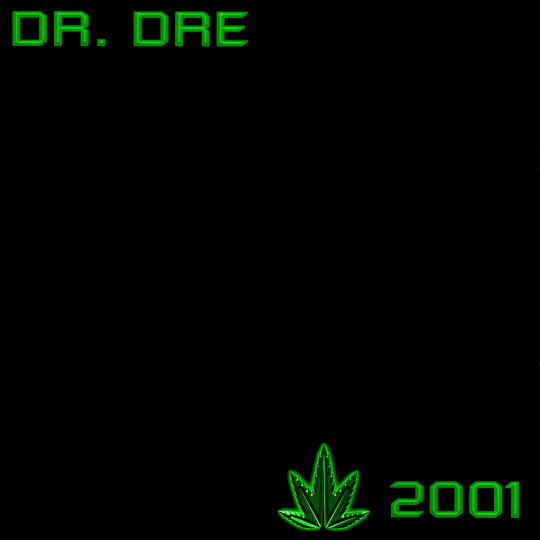
Today in Hip Hop History:
Dr. Dre released his second album The Chronic 2001 November 16, 1999
#today in hip hop history#todayinhiphophistory#hiphop#hip-hop#hip hop#hip hop music#hip hop history#music#history#hip hop culture#music history#dr dre#dr. dre#the chronic 2001#chronic 2001#album#emcee#mc#rap#rapper#dj#deejay#producer#music producer#1999#99#compton
179 notes
·
View notes
Text
The Album
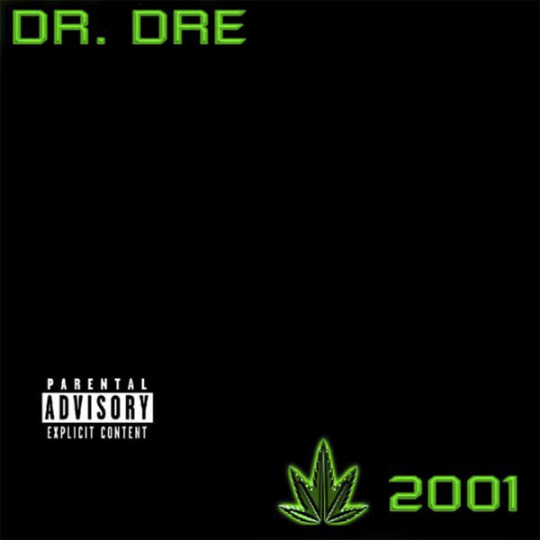
The Single(s)
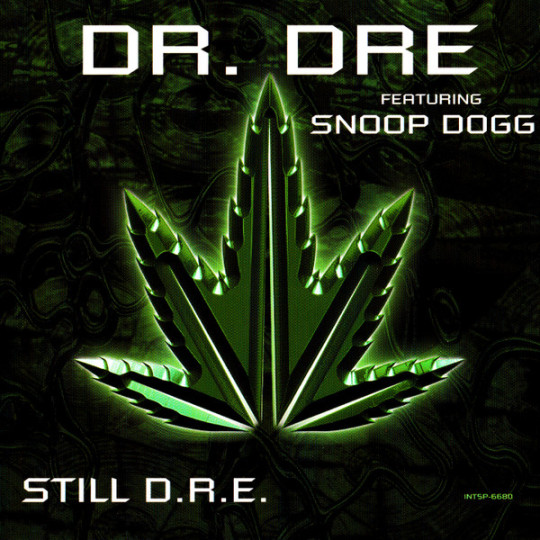
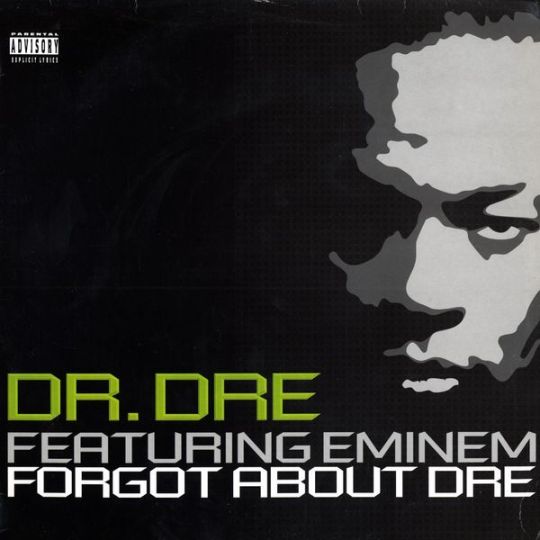
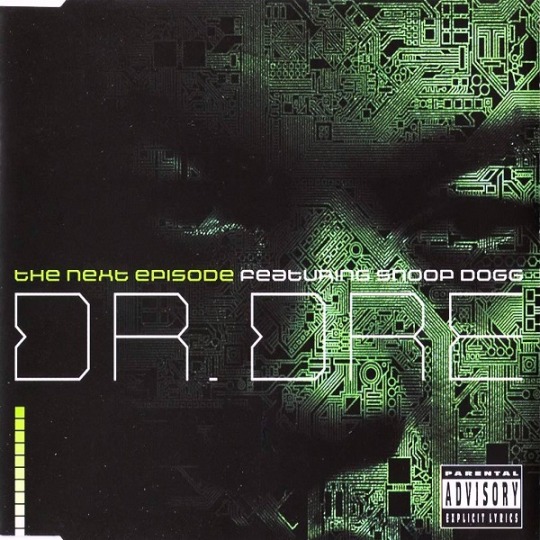
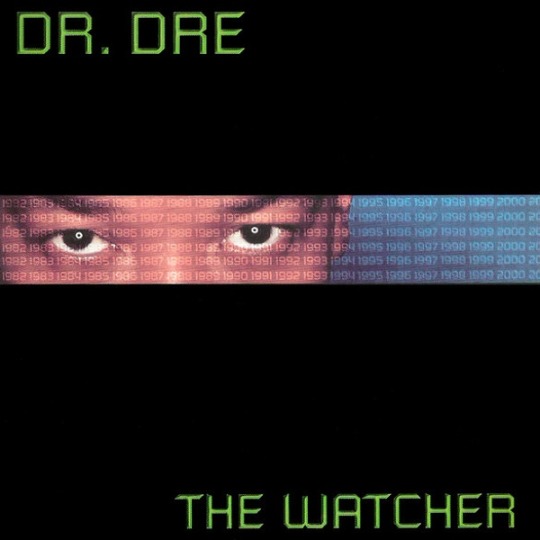
#The Album & The Singles Series#Rap & Hip-Hop#rap#hip-hop#hip hop#hiphop#1990s#90s#Dr. Dre#2001#Chronic 2001#still dre#forgot about dre#the next episode#the watcher#aftermath
3 notes
·
View notes
Note
auto-responder homestuck over the cover for dr dre chronic 2001

17 notes
·
View notes
Text
Dr. Dre
1 note
·
View note
Text
Forever thinking about this Genius note for Eminem’s verse on What’s The Difference.

8 notes
·
View notes
Text
Considering how on-the-nose some of the writing in 2001: A Space Odyssey novel's is, I'm actually really surprised that Dave Bowman's (unmentioned in canon) birthday isn’t November-December.
TL;DR: November-December is the star sign Sagittarius, the archer--i.e., a "bowman", if you will--with a ruling planet of (drumroll please) Jupiter.
#own post#2001 a space odyssey#dave bowman#dave has no canonical birthday and it's annoying#Hal has a birthday#Frank has chronic oversharing disease in 3001#can Dave at least get a birthday
27 notes
·
View notes
Text
#dre#dr dre#chronic#gangstersparadise#gangsta rap#gangs#2001#album#dre albüm#vhswave#vhs gif#old tv#snoop dogg#eminem#tupac shakur
0 notes
Text
Dr dre the chronic album cover 2001

Its hit single “Still D.R.E.”, is certified quadruple platinum by the RIAA and is a household name in the Hip Hop world. As far as its legacy, the album has made its appearances on music charts worldwide since its release and is #17 on the Billboard 200 chart for the 2000s. The album also claimed the #1 spot on the Billboard Top R&B/Hip Hop Albums chart, #4 on the UK Album Chart, and #17 in the Dutch Albums Chart. Here Dre established his patented G-funk sound: fat, blunted Parliament - Funkadelic beats, soulful backing vocals, and live instruments in the rolling basslines and whiny synths. Dre s 1992 solo debut, The Chronic, transformed the entire sound of West Coast rap. Dre Record Label Death Row UPC 0728706300216 eBay Product ID (ePID) 2317113717 Product Key Features Artist Snoop Dogg, Snoop Doggy Dogg Format Record Release Year 2001 Release Title Doggystyle Genre Rap/Hip Hop Dimensions Item Length 12.28 in Item Height 0.20 in Item Width 12.22 in Item Weight 0.82lb. With its stylish, sonically detailed production, Dr. It debuted in 1999 at #2 on the Billboard 200 chart where it peaked and sold 516,000 copies in its first week. Product Identifiers Producer Chris 'The Glove' TaylorDr. The front cover as well as the back cover features a sans serif with angled terminals, which is very similar to Russell Square. It was released in 1999 by Interscope Records as the follow-up to his 1992 debut album The Chronic. It would be an understatement to say that this project was an influential part of west coast rap and culture.Īs previously stated, this album was widely regarded and critically acclaimed. 2001, also known as The Chronic 2001, is the second studio album by American rapper Dr. Rappers such as The D.O.C., Hittman, Snoop Dogg, Kurupt, Xzibit, Nate Dogg and Eminem made appearances on this album. Of course, the production of this album is more solid than most coming from Dre himself along with Mel-Man and Lord Finesse, but he vocal features that were at Dre’s disposal due to his success at the time also helped to make this project such a classic. The quality of work that makes up Chronic 2001 is epic.

0 notes
Text

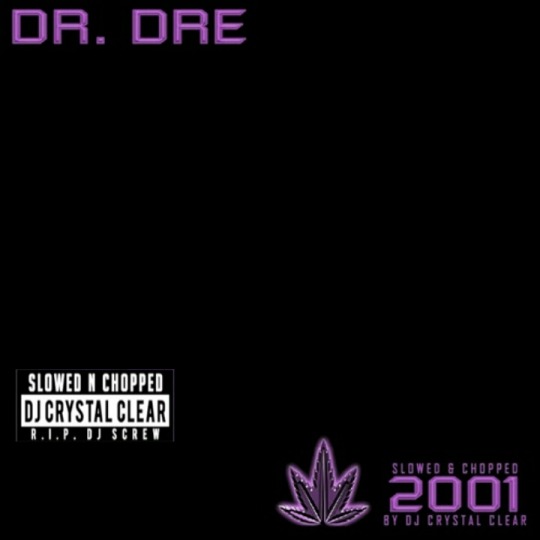

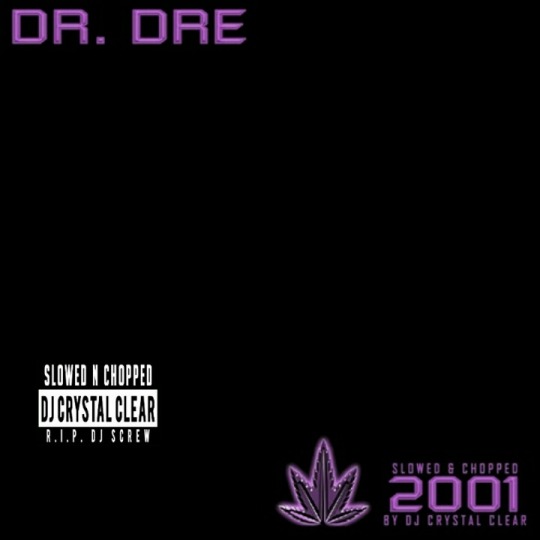

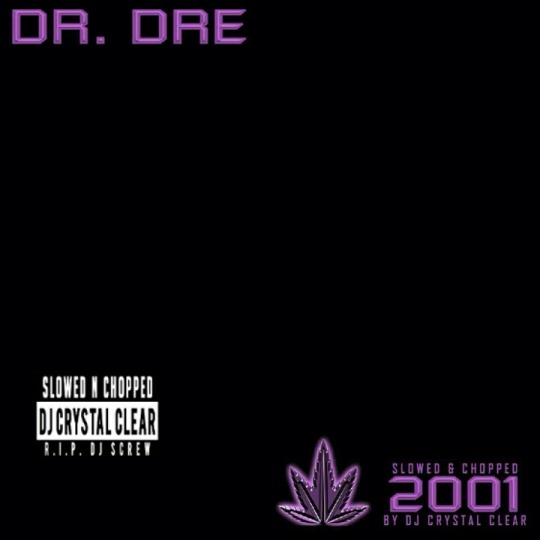




Dr. Dre - The Chronic 2001 Slowed & Chopped By Dj Crystal Clear
#dr. dre#the chronic 2001#aftermath#aftermath records#interscope records#dj screw#djscrewforever#djscrew#ripdjscrew#restinpeacedjscrew#rip dj screw#rest in peace dj screw#chopped not slopped#choppedandscrewed#chopped n screwed#choppednscrewed#chopped&screwed#chopped and screwed#chopped & screwed game
1 note
·
View note
Photo
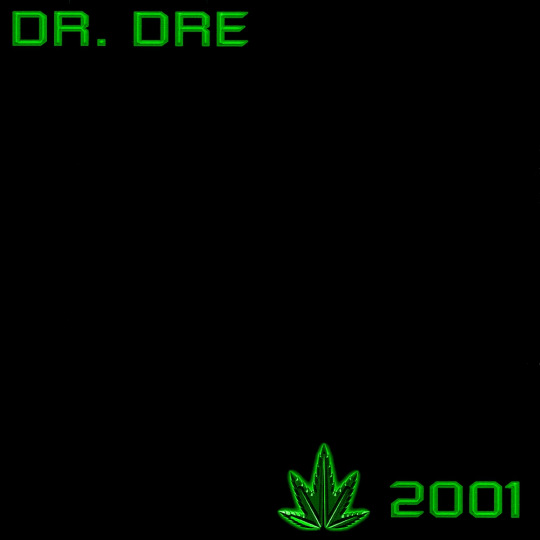
Today in Hip Hop History:
Dr. Dre released his second album The Chronic 2001 November 16, 1999
#today in hip hop history#todayinhiphophistory#hiphop#hip-hop#hip hop#hip hop music#hip hop history#hip hop culture#music#history#music history#dr dre#dr. dre#the chronic 2001#album#emcee#mc#rap#rapper#producer#music producer#1999#dj#deejay#compton
320 notes
·
View notes
Text

#rap & hip-hop#rap#hip-hop#hiphop#1990s#90s#music#dr. dre#dr dre#still dre#snoop dogg#snoop doggy dogg#the chronic#2001#aftermath#gif
6 notes
·
View notes
Text
Linkrot
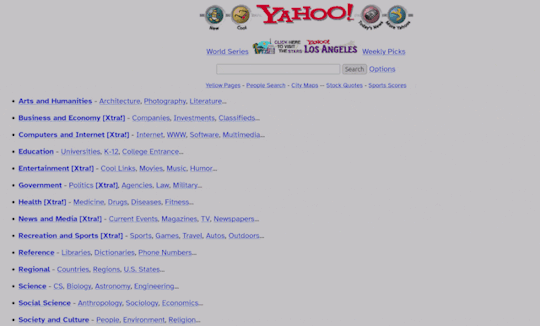
For the rest of May, my bestselling solarpunk utopian novel THE LOST CAUSE (2023) is available as a $2.99, DRM-free ebook!

Here's an underrated cognitive virtue: "object permanence" – that is, remembering how you perceived something previously. As Riley Quinn often reminds us, the left is the ideology of object permanence – to be a leftist is to hate and mistrust the CIA even when they're tormenting Trump for a brief instant, or to remember that it was once possible for a working person to support their family with their wages:
https://pluralistic.net/2023/10/27/six-sells/#youre-holding-it-wrong
The thing is, object permanence is hard. Life comes at you quickly. It's very hard to remember facts, and the order in which those facts arrived – it's even harder to remember how you felt about those facts in the moment.
This is where blogging comes in – for me, at least. Back in 1997, Scott Edelman – editor of Science Fiction Age – asked me to take over the back page of the magazine by writing up ten links of interest for the nascent web. I wrote that column until the spring of 2000, then, in early 2001, Mark Frauenfelder asked me to guest-edit Boing Boing, whereupon the tempo of my web-logging went daily. I kept that up on Boing Boing for more than 19 years, writing about 54,000 posts. In February, 2020, I started Pluralistic.net, my solo project, a kind of blog/newsletter, and in the four-plus years since, I've written about 1,200 editions containing between one and twelve posts each.
This gigantic corpus of everything I ever considered to be noteworthy is immensely valuable to me. The act of taking notes in public is a powerful discipline: rather than jotting cryptic notes to myself in a commonplace book, I publish those notes for strangers. This imposes a rigor on the note-taking that makes those notes far more useful to me in years to come.
Better still: public note-taking is powerfully mnemonic. The things I've taken notes on form a kind of supersaturated solution of story ideas, essay ideas, speech ideas, and more, and periodically two or more of these fragments will glom together, nucleate, and a fully-formed work will crystallize out of the solution.
Then, the fact that all these fragments are also database entries – contained in the back-end of a WordPress installation that I can run complex queries on – comes into play, letting me swiftly and reliably confirm my memories of these long-gone phenomena. Inevitably, these queries turn up material that I've totally forgotten, and these make the result even richer, like adding homemade stock to a stew to bring out a rich and complicated flavor. Better still, many of these posts have been annotated by readers with supplemental materials or vigorous objections.
I call this all "The Memex Method" and it lets me write a lot (I wrote nine books during lockdown, as I used work to distract me from anxiety – something I stumbled into through a lifetime of chronic pain management):
https://pluralistic.net/2021/05/09/the-memex-method/
Back in 2013, I started a new daily Boing Boing feature: "This Day In Blogging History," wherein I would look at the archive of posts for that day one, five and ten years previously:
https://boingboing.net/2013/06/24/this-day-in-blogging-history.html
With Pluralistic, I turned this into a daily newsletter feature, now stretching back to twenty, fifteen, ten, five and one year ago. Here's today's:
https://pluralistic.net/2024/05/21/noway-back-machine/#retro
This is a tremendous adjunct to the Memex Method. It's a structured way to review everything I've ever thought about, in five-year increments, every single day. I liken this to working dough, where there's stuff at the edges getting dried out and crumbly, and so your fold it all back into the middle. All these old fragments naturally slip out of your thoughts and understanding, but you can revive their centrality by briefly paying attention to them for a few minutes every day.
This structured daily review is a wonderful way to maintain object permanence, reviewing your attitudes and beliefs over time. It's also a way to understand the long-forgotten origins of issues that are central to you today. Yesterday, I was reminded that I started thinking about automotive Right to Repair 15 years ago:
https://www.eff.org/deeplinks/2009/05/right-repair-law-pro
Given that we're still fighting over this, that's some important perspective, a reminder of the likely timescales involved in more recent issues where I feel like little progress is being made.
Remember when we all got pissed off because the mustache-twirling evil CEO of Warners, David Zaslav, was shredding highly anticipated TV shows and movies prior to their release to get a tax-credit? Turns out that we started getting angry about this stuff twenty years ago, when Michael Eisner did it to Michael Moore's "Fahrenheit 911":
https://www.nytimes.com/2004/05/05/us/disney-is-blocking-distribution-of-film-that-criticizes-bush.html
It's not just object permanence: this daily spelunk through my old records is also a way to continuously and methodically sound the web for linkrot: when old links go bad. Over the past five years, I've noticed a very sharp increase in linkrot, and even worse, in the odious practice of spammers taking over my dead friends' former blogs and turning them into AI spam-farms:
https://www.wired.com/story/confessions-of-an-ai-clickbait-kingpin/
The good people at the Pew Research Center have just released a careful, quantitative study of linkrot that confirms – and exceeds – my worst suspicions about the decay of the web:
https://www.pewresearch.org/data-labs/2024/05/17/when-online-content-disappears/
The headline finding from "When Online Content Disappears" is that 38% of the web of 2013 is gone today. Wikipedia references are especially hard-hit, with 23% of news links missing and 21% of government websites gone. The majority of Wikipedia entries have at least one broken link in their reference sections. Twitter is another industrial-scale oubliette: a fifth of English tweets disappear within a matter of months; for Turkish and Arabic tweets, it's 40%.
Thankfully, someone has plugged the web's memory-hole. Since 2001, the Internet Archive's Wayback Machine has allowed web users to see captures of web-pages, tracking their changes over time. I was at the Wayback Machine's launch party, and right away, I could see its value. Today, I make extensive use of Wayback Machine captures for my "This Day In History" posts, and when I find dead links on the web.
The Wayback Machine went public in 2001, but Archive founder Brewster Kahle started scraping the web in 1996. Today's post graphic – a modified Yahoo homepage from October 17, 1996 – is the oldest Yahoo capture on the Wayback Machine:
https://web.archive.org/web/19960501000000*/yahoo.com
Remember that the next time someone tells you that we must stamp out web-scraping for one reason or another. There are plenty of ugly ways to use scraping (looking at you, Clearview AI) that we should ban, but scraping itself is very good:
https://pluralistic.net/2023/09/17/how-to-think-about-scraping/
And so is the Internet Archive, which makes the legal threats it faces today all the more frightening. Lawsuits brought by the Big Five publishers and Big Three labels will, if successful, snuff out the Internet Archive altogether, and with it, the Wayback Machine – the only record we have of our ephemeral internet:
https://blog.archive.org/2024/04/19/internet-archive-stands-firm-on-library-digital-rights-in-final-brief-of-hachette-v-internet-archive-lawsuit/
Libraries burn. The Internet Archive may seem like a sturdy and eternal repository for our collective object permanence about the internet, but it is very fragile, and could disappear like that.

If you'd like an essay-formatted version of this post to read or share, here's a link to it on pluralistic.net, my surveillance-free, ad-free, tracker-free blog:
https://pluralistic.net/2024/05/21/noway-back-machine/#pew-pew-pew
272 notes
·
View notes
Text



“Name me a single objective we’ve ever set out to accomplish that we’ve failed on. Name me one, in all of our history. Not one!”
-President Joe Biden, August 16, 2023
Joe Biden in one of his now accustomed angry “get off my grass” moods dared the press to find just one of his policies/objectives that has not worked. Silence followed.
Perhaps it was polite to say nothing, given even the media knows almost every enacted Biden policy has failed.
Here is a summation of what he should instead apologize for.
Biden in late summer 2021 sought a 20th anniversary celebration of 9/11 and the 2001 subsequent invasion of Afghanistan. He wished to be the landmark president that yanked everyone out of Afghanistan after 20 years in country. But the result was the greatest military humiliation of the United States since the flight from Vietnam in 1975.
Consider the ripples of Biden’s disaster. U.S. deterrence was crippled worldwide. China, Russia, Iran, and North Korea almost immediately began to bluster or return to their chronic harassment of U.S. and allied ships and planes. We left thousands of allied Afghans to face Taliban retribution, along with some Western contractors.
Biden abandoned a $1 billion embassy, and a $300 million remodeled Bagram airbase strategically located not far from China and Russia, and easily defensible. Perhaps $50 billion in U.S. weaponry and supplies were abandoned and now find their way into the international terrorist mart.
All our pride flags, our multimillion gender studies programs at Kabul University, and our George Floyd murals did not just come to naught, but were replaced by the Taliban’s anti-homosexual campaigns, burkas, and detestation of any trace of American popular culture.
Vladimir Putin sized up the skedaddle. He collated it with Biden’s unhinged quip that he would not get too excited if Putin just staged a “minor” invasion of Ukraine. He remembered Biden’s earlier request to Putin to modulate Russian hacking to exempt a few humanitarian American institutions. Then Russia concluded of our shaky Commander-in-Chief that he either did not care or could do nothing about another Russian invasion.
The result so far is more than 500,000 dead and wounded in the war, a Verdun-stand-off along with fortified lines, the steady depletion of our munitions and weapon stocks, and a new China/Russia/Iran/North Korean axis, with wink and nod assistance from NATO Turkey.
Biden blew up the Abraham accords, nudged Saudi Arabia and the Gulf States over to the dark side of Iran, China, and Russia. He humiliated the U.S. on the eve of the midterms by callously begging the likes of Iran, Venezuela, Russia, and Saudi Arabia to pump more oil that he had damned as unclean at home and cut back its production. In Bidenomics, instead of producing oil, the president begs autocracies to export it to us at high prices while he drains the nation’s strategic petroleum reserve for short-term political advantage.
Biden deliberately alienated Israel by openly interfering in its domestic politics. He pursued the crackpot Iran Deal while his special Iranian envoy was removed for disclosing classified information.
No one can explain why Biden ignored the Chinese balloon espionage caper, kept mum about the engineered Covid virus that escaped the Wuhan lab, said not a word about a Chinese biolab discovered in rural California, and had his envoys either bow before Chinese leaders or take their insults in silence—other than he is either cognitively challenged or leveraged by his decade-long grifting partnership with his son Hunter.
Yet another Biden’s legacy will be erasing the southern border and with it, U.S. immigration law. Over seven million aliens simply crossed into the U.S. illegally with Biden’s tacit sanction—without audits, background checks, vaccinations, and COVID testing, much less English fluency, skills, or high-school diplomas.
Biden’s only immigration accomplishment was to render the entire illegal sanctuary city movement a cruel joke. Given the flood, mostly rich urban and vacation home dwellers made it very clear that while they fully support millions swarming into poor Latino communities of southern Texas and Arizona, they do not want any illegal aliens fouling their carefully cultivated nests.
Biden is mum about the 100,000 fentanyl deaths from cartel-imported and Chinese-supplied drugs across his open border. He seems to like the idea that Mexican President Obrador periodically mouths off, ordering his vast expatriate community to vote Democratic and against Trump.
Despite all the pseudo-blue collar dissimulation about Old Joe Biden from Scranton, he has little empathy for the working classes. Indeed, he derides them as chumps and dregs, urges miners to learn coding as the world covets their coal, and studiously avoids getting anywhere near the toxic mess in East Palestine, Ohio, or so far the moonscape on Maui.
Bidenomics is a synonym for printing up to $6 billion dollars at precisely the time post-Covid consumer demand was soaring, while previously dormant supply chains were months behind rebooting production and transportation. Biden is on track to increase the national debt more than any one-term president.
In Biden’s weird logic, if he raised the price of energy, gasoline, and key food staples 20-30 percent since his inauguration without a commensurate rise in wages, and then saw the worst inflation in 40 years occasionally decline from record highs one month to the next, then he “beat inflation.”
But the reason why more than 60 percent of the nation has no confidence in Bidenomics is because it destroyed their household budgets. Gas is nearly twice what it was in January 2021. Interest rates have about tripled. Key staple foods are often twice as costly—meat, vegetables, and fruits especially.
Biden has ended through his weaponized Attorney General Merrick Garland the age-old American commitment to equal justice under the law. The FBI, DOJ, CIA, and IRS are hopelessly politically compromised. Many of their bureaucrats serve as retrieval agents for lost Biden family incriminating laptops, diaries, and guns. In sum, Biden criminalized opposing political views.
Biden has unleashed the administrative state for the first time in history to destroy the Republican primary front runner and his likely opponent. His legacy will be the corruption of U.S. jurisprudence and the obliteration of the American reputation for transparent permanent government that should be always above politics, bribery, and corruption.
If in the future, an on-the-make conservative prosecutor in West Virginia, Utah, or Mississippi wishes to make a national name, then he has ample precedent to indict a Democrat President for receiving bad legal advice, questioning the integrity of an election, or using social media to express doubt that the new non-Election-Day balloting was on the up-and-up, or supposedly overvaluing his real estate.
The Biden family’s decade-long family grifting will likely expose Joe Biden as the first president in U.S. history who fitted precisely the Constitution’s definition of impeachment and removal—given his “high crimes and misdemeanors” appear “bribery”-related. If further evidence shows he altered U.S. foreign policy in accordance with the wishes from his benefactors in Ukraine, China, or Romania, then he committed constitutionally-defined “treason” as well.
Defunding the police, and pandemics of exempted looting, shoplifting, smashing, and grabbing, and carjacking merit no administrative attention. Nor does the ongoing systematic destruction of our blue bicoastal cities, Los Angeles, New York, Portland, San Francisco, Seattle, and Washington, D.C. All that, along with the disasters in East Palestine or Maui are out of sight, out of mind from a day at the beach at Biden’s mysteriously purchased nearly 6,000 square-foot beachfront mansion.
Biden ran on Barack Obama-like 2004 rhetoric (“Well, I say to them tonight, there is not a liberal America and a conservative America — there is the United States of America).”
And like Obama, he used that ecumenical sophistry to gain office only to divide further the U.S. No sooner than he was elected, we began hearing from the great unifier eerie screaming harangues about “semi-fascists” and “ultra-MAGA” dangerous zealots, replete with red-and black Phantom of the Opera backdrops.
What followed the unifying rhetoric was often amnesties and exemptions for violent offenders during the 120 days of rioting, looting, killing, and attacks on police officers in summer 2020. In contrast, his administration lied when it alleged that numerous officers had died at the hands of the January 6 rioters. In addition, the Biden administration mandated long-term incarceration of many who committed no illegal act other than acting like buffoons and “illegally parading.”
The message was exemptions for torching a federal courthouse, a police precinct, or historic church or attempting to break into the White House grounds to get a president and his family—but long prison terms for wearing cow horns, a fur vest, and trespassing peacefully like a lost fool in the Capitol.
Finally, Biden’s most glaring failure was simply being unpresidential. He snaps at reporters, and shouts at importune times. He can no longer read off a big-print teleprompter. Even before a global audience, he cannot kick his lifelong creepy habit of turkey-gobbling on children necks, blowing into their ears and hair of young girls, and squeezing women far too long and far too hard.
His frailty redefined American presidential campaigning as basement seclusion and outsourcing propaganda to the media. And his disabilities only intensified during his presidency. Biden begins his day late and quits early. He has recalibrated the presidency as a 5-hour, 3-day a week job.
If Trump was the great exaggerator, Biden is our foremost liar. Little in his biography can be fully believed. He lies about everything from his train rides to the death of his son to his relationship with Biden-family foreign collaborators, to vaccinations to the economy. Anytime Biden mentions places visited, miles flown, or rails ridden, he is likely lying.
Biden continues with impunity because the media feels that a mentally challenged fabulist is preferable to Donald Trump and so contextualizes or ignores his falsehoods. Never has a U.S. president fallen and stumbled or gotten lost on stage so frequently—or been a single small trip away from incapacity.
So, yes, Biden’s initiatives have succeeded only in the sense of becoming successfully enacted—and therefore nearly destroying the country.
538 notes
·
View notes
Text
I think I have some good news regarding my disability case.
I physically went to the hospital records department and they keep records for 30 years.
30 YEARS!
I was so relieved when the lady said that. And I was like, "That is going to save my life." And she gave me a very awkward look.
So I am really hopeful they will have a record of my ECT. And if I have proof I got shock treatments, I can show it to my old psychiatrist and I'm hoping he will write a letter on my behalf.
Also, my regular doctor's chart from 2001 says I had depression and that I was given ECT.
So evidence from multiple sources.
And since ECT is only done in severe cases, I am hoping that will be enough evidence to convince Social Security I have been chronically ill since before my 22nd birthday.
122 notes
·
View notes
Text
The Evolution of Pop Punk Gojo / No Scrubs
Honestly the real answer as to why he's such a pop punk gremlin in May Death Never Stop You is bc I wanted him to be lol. But I did come up with a backstory for it even if I doubt it'll ever make the fic itself.
Keep in mind this is not at all part of the story and Gojo / No Scrubs can play whatever music you want, any songs I call out specifically are really just examples.
BABY PUNK IN THE MAKING ERA: 2000
It’s 2000. The Sony Walkman CD player has been around for over 15 years; the iPod is only a year away.
Gojo is ten years-old and he’s just lost his useless minders in the crowded, tangled streets around Harajuku.
Being allowed out alone (for a given definition of alone, but at the very least without the usual entourage befitting the young master of an ancient house) is a new experience for him. He’s spent the entirety of his life enclosed within the guarded walls of the Gojo clan, learning his clan’s history and techniques. It’s been a very sheltered and secluded existence, and not entirely without reason; since the heralded birth of the Six Eyes holder, assassins and curses alike have been after him. The existence of Gojo Satoru changed the world order, and he was guarded accordingly. It’s rare he has a chance to leave the clan compound, rarer still to be out alone.
But he’s almost eleven now, and he’s mastered his clan’s Limitless Blue technique as well as Infinity; even first-grade curses wouldn’t give him much trouble anymore. He no longer needs the stifling protection of his clan to the degree he had as a small child, and accordingly the hold his clan has on him is growing tenuous. So he’s given the day in Tokyo, ostensibly to find himself a present for his birthday.
He probably would have just gone with cake— he has a rampant sweet tooth, but is rarely allowed to eat sweets— but he’s distracted by blaring, foreign music.
He finds himself alone in front of a record store blasting rock music from a boombox speaker in the front. The store is full of punk clothing, streetwear, and endless rows of CDs all stuffed full of questionably dressed youths. The whole store is very Western, which is a novelty for a child with a very traditional and secluded upbringing in the already secluded Jujutsu society— it’s noisy and loud and seems to be the antithesis to everything his clan has tried to teach him about etiquette and propriety as the scion of a noble house; suffice it to say, he loves it at first sight.
So of course the first thing he does is buy himself a Sony Walkman and grab a handful of CDs from the front table.
The hapless and chronically underpaid part-timer who happened to stock the front display that day was not prepared to accidentally set the most powerful Jujutsu sorcerer on his road of anti-establishment chaos, but really what else did you expect from putting up all that 90's alt-grunge?
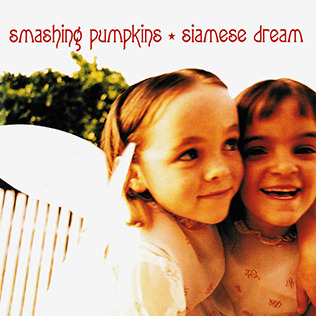
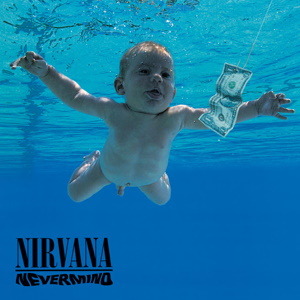
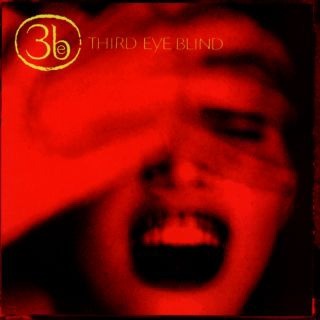
Siamese Dream ℗ Smashing Pumpkins, 1994 | Nevermind ℗ Nirvana, 1991 | Third Eye Blind ℗ Third Eye Blind, 1997
Gojo basically grew up in a house with little exposure to music, so throwing himself directly into a genre baked in themes of social alienation, angst, and loneliness that happened to perfectly reflect his own life experiences was something of a happy coincidence. He didn't understand nearly enough English at the time to comprehend the lyrics, but the feeling was conveyed nonetheless.
At some point during his pre-teen angst era he gets access to a computer. His very traditional and insulated family have no fucking clue what the hell a computer even is, so when he says he wants one and goes and gets it they have no idea what kind of open frontier they're giving him with access to the internet. 2001 rolls around and Gojo gets his hands on his first iPod, and promptly becomes that kid on iTunes who racks up hundreds of dollars worth of music purchases before even realizing what he's done.
Most Played Tracks on Gojo's poor Sony Walkman:
Nirvana: Come As You Are, Rape Me, Smells Like Teen Spirit, In Bloom
Smashing Pumpkins: Mayonaise, Today, Cherub Rock, 1979, Bullet with Butterfly Wings
Soundgarden: Black Hole Sun, Spoonman
Third Eye Blind: Semi-Charmed Life, How's It Going to Be, Jumper, Narcolepsy
--MIDDLE SCHOOL GLORY DAYS ERA | 2002 - 2005--
He's in junior high when Fall Out Boy drops Take This To Your Grave in 2003. He's a tiny body of angst and arrogance at the time, so the rebellious-spirited, nihilistic bad-boy aesthetic of pop-punk really resonated with him. He gets really into it; middle school sucks for everyone, but it especially sucks when you've been heralded as a once-in-a-generation sorcerer with god-like powers yet somehow you're still shucked into an elitist young master's private school full of normal (if not blindingly rich) people.
Gojo is very good looking and very good at everything he tries his hand at, so it's not a matter of popularity necessarily. People flock to him all the time, but even amongst a crowd of enamored pre-teens he's never felt more alone. His arrogant personality keeps everyone at a distance, just as he likes it. It all seems so pointless to him, when he's going to Jujutsu Tech for high school anyway. These people don't matter, and they may as well be aliens with how much they live in an entirely different world than Gojo.
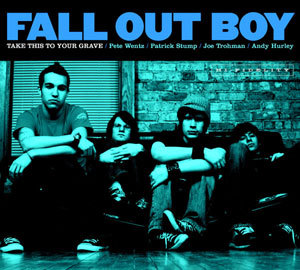
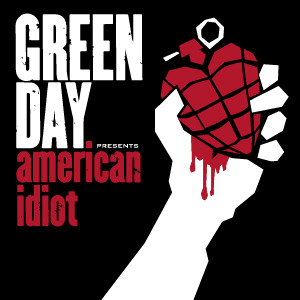
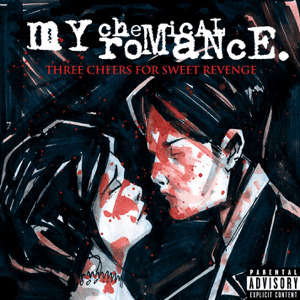
Take This To Your Grave ℗ Fall Out Boy, 2003 | American Idiot ℗ Green Day, 2004 | Three Cheers for Sweet Revenge ℗ My Chemical Romance, 2004
This is also around the time he commits himself to actually learning English well enough to understand the lyrics - no matter how fast or convoluted the accent - and he spends a lot of time ignoring the world in his room with his headphones at full blast. A rite of passage for any self-respecting preteen full of existential fatalism.
Completely alone even as he's put on a pedestal by Jujutsu society, music is really his only solace. It makes a profound impact on him, if only because it's the only human touch that can still reach him through his Infinity. He's pushed everyone out of his life but Gerard Way and Patrick Stump, which I also firmly believe is a preteen rite of passage.
He definitely lays around in bed and debates blowing things up, except unlike regular preteens who regularly stomp up to their room and slam the door shut and tell the world to fuck off he's actually capable of doing it. He doesn't though, and instead just listens to You Know What They Do to Guys Like Us in Prison for the hundredth time.
Songs that Made it Onto Gojo's iPod Shuffle:
Blink 182: What's my Age Again, Mutt, Stay Together For the Kids
Bowling for Soup: 1985
Fall Out Boy: Homesick at Space Camp, Reinventing the Wheel to Run Myself Over, Saturday
Green Day: Jesus of Suburbia, American Idiot, Holiday,
Good Charlotte: The Anthem, Lifestyles of the Rich and the Famous
Lit: My Own Worst Enemy
The Killers: When You Were Young, Mr. Brightside, Somebody Told Me
My Chemical Romance: You Know What They Do to Guys Like Us in Prison, I Never Told You What I do For a Living, I'm Not Okay (I Promise), Famous Last Words, Helena
Sum 41: Fat Lip, In Too Deep
Weezer: Say it AIn't So
--HIGH SCHOOL ANGST ERA | 2005 - 2008--
Gojo finally starts his tenure as a student at Jujutsu Tech and it's... unexpected. There are only two other sorcerers in his year and he's not really getting along with either of them. Not that he really puts in anything but a nominal effort. He's spent all of his junior high career as the king of his school, and that was among a bunch of kids who couldn't even comprehend his actual greatness.
Now he's returned to the Jujutsu World, and becomes the irreverent, chaotic, rule-flaunting little shit we all love and adore.
He's a bit disillusioned by it all, to be honest. Life, generally, but also all the pageantry that goes into every facet of it. There's a certain anxiety and depression that goes along with looking at your own life, which is the premise of most of Pete Wentz's lyrics on Fall Out Boy's Under the Cork Tree and also just the thematic overview of Gojo's high school existence. There's an emptiness that comes after the existential dread of self-introspection that Gojo promptly fills up with Fall Out Boy, and then with the addition of Infinity on High (his favorite album, entirely because it has Infinity in the name) even more Fall Out Boy.
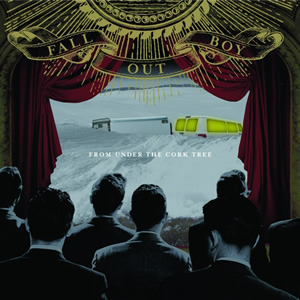


From Under the Cork Tree ℗ Fall Out Boy, 2005 | So Wrong, It's Right ℗ All Time Low, 2007 | Infinity on High ℗ Fall Out Boy, 2007
It's an era of Fall Out Boy for him, interspersed with some other great bands of the time/genre. This is also around the time that online music radio Pandora was making its rounds amongst the online music scene, which Gojo spent a surprising amount of time in, for someone who had little to no interest in making music himself.
It would have been nice to be able to bond with his fellow students over music, like he's seen in plenty of movies, but Shoko is a die-hard City Pop fan and Suguru is one of those disturbing 'I just listen to whatever's on the radio' types. Maybe there are other kids in the other years that have better taste, but Gojo's not really the sort to be broadcasting his likes or interests like that - doesn't really fit his 'bad boy' image.
He starts high school pretty firmly entrenched in his pop-punk / emo phase, but it's a pretty tumultuous three years of his life - and society in general, with the internet becoming mainstream and smartphones hitting consumer markets globally - and his music tastes reflect this.
Most Played Tracks on Gojo's Hot Pink iPod Nano:
All Time Low: Dear Maria Count Me In, Six Feet Under the Stars, Coffee Shop Soundtrack, Stay Awake
Cage the Elephant: In One Ear, Back Against the Wall
Fall Out Boy: Sugar We're Going Down, Dance Dance, Nobody Puts Baby in The Corner, A Little Less Sixteen Candles, Thnks fr the Mmrs, This Ain't a Scene It's an Arms Race, The Take Over the Break's Over, Coffee's for Closers
Modest Mouse: Float On, Dashboard
My Chemical Romance: Cancer, Disenchanted
Panic! At the Disco: I Write Sins Not Tragedies, But It's Better if You Do
Paramore: Misery Business, That's What You Get, Decode
Red Hot Chili Peppers: Dani California, Scar Tissue, Under the Bridge
Taking Back Sunday: Makedamnsure, Twenty Twenty Surgery, Cute Without the 'E' (Cut from the Team)
The Strokes: Reptilia, Last Night, Someday
--- ADULTING IS FOR OTHER PEOPLE ERA | 2008+ ---
Post Star Plasma Vessel/Suguru's defection Gojo is a Mess™, but you'll never know it because he continues on acting like an irreverent little shit who doesn't care about anything.
He goes through a period where he doesn't consciously reject the songs that encapsulated his idyllic teenage life, but nonetheless pivots away from the pop-punk genre. He spends a lot of time pulling that Pablo Escobar Narcos meme and staring blankly out into bleak vistas in total silence and solitude. In hindsight, for all his teenage angst and loneliness, his time with Shoko and Suguru had been the least lonely he'd ever felt. Now that he's once again entirely on his own - Shoko off being a doctor and Suguru going off the deep end - he realizes he'd had a brief taste of the feeling of belonging he'd been missing his whole life.
He gets into a lot of indie pop and post-punk stuff, with more electric and synthetic sounds and upbeat tempos.
He traded in his trusty iPod Nano to an iPod Touch, and shortly after switched to the iPhone when it hit the global markets in 2009. Yeah, he was one of those Apple heads, the kind who always had to have the latest Macs and Apple products. In his defense, he was not a tech snob so much as a music snob, and at the time iTunes was the dominant music platform.



Wolfgang Amadeus Phoenix ℗ Phoenix, 2009 | Oracular Spectacular ℗ MGMT, 2007 | The Modern Glitch ℗ The Wombats, 2011
He spends most of his early 20's in an indie phase, gets into a lot of electronic, and then from there uses the powers of the internet and gets into all sorts of other genres. One way or another he spends some time in the disco/house music neighborhood, a genre he and Makoto will spectacularly bond over, only to then do a total 180 and decide to form a pop-punk band together.
By the time he's stuck in his second life, it's been decades since he's listened to some of those songs he used to love as an angsty teenager. As an adult he lost track of all his old CDs, probably gathering dust in the attic of the Gojo clan house he avoids at all costs, and as the world moved towards streaming services he stopped keeping up with his staggering iTunes library. It's not as if he forgot those bands or anything, but as the world's strongest sorcerer he rarely had the time to listen to music like he used to.
When he gets dragged back into life as Todoroki Touya, it's been ages since he's heard Fall Out Boy and frankly, he misses it.
There's a glaring lack of the grunge, pop-punk and emo music in this new world he's in, and after digging around online - and begrudgingly, the local library for history books once the internet proves unforthcoming - he learns that most of those bands he used to love don't even exist in this world. Quirks appeared in this parallel universe just around the time Gojo himself had been born. The global upheaval that followed that profound change in human existence caused a chain of events that would have all the disenfranchised youths of the 90's and 2000's too distracted by global chaos, world wars and civil terrorism to make the music he loved and remembered. Music is art after all, and art is a direct response to the experiences of the people who make it.
As far as Gojo's concerned, not having the likes of Nirvana or My Chemical Romance in an entire human history is an absolutely travesty, so he sets out to not only bring those songs back for himself but also as the one good deed he'll ever care to do in this second life of his. And if he happens to make tons of money and reach critical acclaim while he does it... that's just a bonus.
128 notes
·
View notes
Text
I'm grumpy about Silent Hill again...
TW for discussions of suicide, self harm, abuse (both parent to child and amongst peers) and general spookiness. Y'know... the usual Silent Hill rigmarole of trauma and despair.
Also be warned that I'm going to spoil a lot of the Silent Hill series, in particular Silent Hill 2 and the Short Message game that just came out.
***
So... one of my most popular posts out there is this one. It's about Pyramid head and the loss of subtlety in media. And I couldn't help but feel like we hadn't moved an inch from when I posted that back in... *checks date on post*
hrrk. my bones...
2017.
I'm going to die soon.
Anyway.
Today I watched Second Wind do a run of the short, free-to-play Silent Hill: Short Message. I admittedly had a good bit of trepidation going in just because of the marketing. Which, for all of you marketing majors out there, that is called "Not a good sign." Marketing should make you want to play a game... especially if you're a fan of the series already. But this... it was a bit of a wet blanket, largely due to the fact that it spoiled a lot of the focus of the game. It basically said "this is a game about how bullying and being chronically online is real bad. We're gonna be spooky about it now." And... straining to push aside how incredibly reductive that is... why give it away? Why say it out loud? Why did you tell us what you are doing?
Can you imagine Silent Hill 2 if we'd known it was about James killing his wife from the jump? We didn't. We hadn't the first clue. We knew nothing other than that he was looking for her and she was maybe dead? But we didn't know how... possibly lung cancer or TB given that she had the most pointed coughing sequence since the movie Tombstone. And hey... the last game had someone looking for a loved one too. Maybe that's the deal with Silent Hill. Who knows? No one did at that point. It was still a big old mystery for the most part.
And then the E3 trailer... like there's the weird pretty lady in jail? But what's she talking about? Who the fuck is Mary? Is that... his wife? Well then who the hell is Ms. Miniskirt? No wait... is that his wife in the VHS tape? What the hell is going on? Oh look gameplay! And... a little girl? And a weird guy with a gun... This soundtrack slaps. I'm gonna go see if it's up on Napster yet. (this was 2001... again... my bones etc)
I remember combing over low-res copies of that video for HOURS when it came out. Why are the nurses different? It's not snowing? Who are all these people... And why do they all sound like they put ketamine in their coffee. It was like a great big puzzle to work out and we had a ball theorizing and researching so when it came out we were HYPE.
And that was largely because in short... we knew SOME things at release. Fog. Nurses. Big stick. Weird people. Banger soundtrack. Dead (but probably not) wife. And we presumed or supposed more... cult activity? New beasties? Radio maybe? But we effectively knew nothing about the plot. And the best part was, while they had a solid hook (Find dead lady who we love so huggy buggy much) and instant intrigue (Angela in the cemetery being weirder than a film by David Lynch), and a very familiar setting (we may have improved draw distance on the PS2, but we don't have to use it!), we still didn't really know what was going on. The plot was essentially unfolding out of a black box. Silent Hill 2 was quite content to be a slower burn than trying to boil the Lake Superior with a signal flare. You don't even see the main "villain" Pyramid Head until a few hours in and, as I pointed out in that other post, there's no flashy cut scene to introduce him and go WOOOOOO SCARYYYYY. He's just chillin' behind some prison bars (which that totes is normal in an apartment complex) and staring at you like I stare at the inside of my fridge when I really would like some cheese to materialize.
And then... like we're not even really sure what the hell is going on for the longest time. We meet our wife's hot twin with the key to a strip club and she keeps getting killed over and over... and things keep getting increasingly rapey and lewd in a way that's just uncomfortable more than anything... But even at the end. Even with the big reveal of "You killed your wife." they still don't ever explicitly state "And you killed her because you couldn't have sex with her anymore." It wasn't until you finished the game, and talked to someone else about it, or let your brain cook on it for a bit that you went... heyyyy... he's a horndog!
(In fact... if I'm going to chide SH2 for anything it's that right at the very VERY end they tried to frame James's actions as understandable because the woman who was dying and frightened and in pain was mean to him. Yes, being a caretaker is hard. But Christ... pick a topic for discussion.)
But contrast all that with Short Message. The marketing and such all said out loud "THIS IS ABOUT BULLYING" so even going in... I was already like "yep. The bully is probably us, but we had reasons because we have to be complicated and you aren't allowed to make the player feel bad" And lo was I correct. There was no... intrigue. I was never curious about the character or the people around her because I knew this story. They already told me what story they were telling so I could practically sing along, especially as a millennial that had to grow up watching little videos and skits in school about the evils of bullying. And when you are going to tell a trope-ish story, and you tell the audience what the trope is, it becomes "say the line" writ large.
This isn't me advocating for super twisty unexpected plot arcs (looking at you, Supernatural). Far from it. You absolutely should tell a story in such a way that the audience understands how you got from point A to point Z, even if there are some surprises along the way (See Sixth Sense for that masterclass).
Rather, what I'm missing from this (and frankly a lot of the Silent Hill games and honestly... media in general these days) is a sense of restraint. A sense of trust in their audience to "get it." They can't just plonk us in the fog with a radio and a stick and say "You're here to find your best friend/dog/cousin/wife/business partner. Good luck. Here's a weirdo to prattle cryptically at you in order to unsettle you immediately. Bye!" No! They have to tell us what kind of story they're telling and what themes are important. They can't just... give us a Silent Hill Game and trust that we know what to do with it. It's... insulting frankly. Especially as a longtime fan of the franchise who remembers when they did trust us and they did have faith in their work.
I will say this in compliment to Short Message. The environment design was pretty cool. Especially the sticky-note hallways... they looked like leaves... and sometimes teeth... and like tightly packed bones in an ossuary. It didn't... say anything really. But it looked cool. And you can't go wrong with Akira Yamaoka's soundtrack.
But... while I'm on the subject of design. Y'all. An animate sakura tree in an oversized hoodie is not scary. But bless you for at least having the restraint to not make her Pyramid Head.
#silent hill#silent hill 2#silent hill 4#silent hill short message#horror#writing#story telling#suspense#video games#video game design#horror games
27 notes
·
View notes